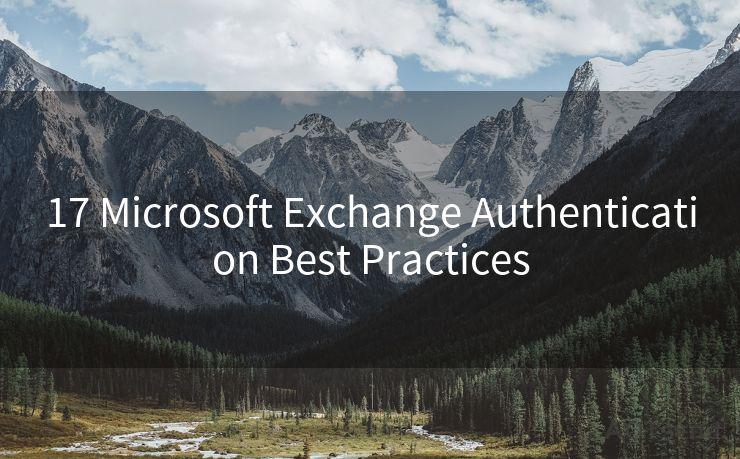17 Microsoft Exchange Authentication Best Practices




When it comes to enterprise-level email communication, Microsoft Exchange stands as a leading platform. However, with the increasing number of cyber threats, it's crucial to follow best practices for authentication to ensure secure communication. Here are 17 Microsoft Exchange authentication best practices that can help you keep your email system secure.
1. Enable Multi-Factor Authentication (MFA)
Multi-Factor Authentication adds an extra layer of security to the login process. By requiring additional verification methods like a code sent to a mobile device, MFA makes it harder for unauthorized users to access accounts.
2. Utilize Strong Passwords
Enforce strong password policies, including a minimum length, a mix of uppercase, lowercase, numbers, and special characters. Regularly remind users to update their passwords and avoid using easily guessable or common patterns.
3. Implement Role-Based Access Control (RBAC)
RBAC allows administrators to control access to Exchange resources based on job roles and responsibilities. This ensures that only authorized users can access sensitive information.
4. Disable Legacy Authentication
Legacy authentication methods, like IMAP and POP3, are less secure than modern authentication protocols. Disabling these older methods reduces the risk of unauthorized access.
5. Use Secure Sockets Layer (SSL)/Transport Layer Security (TLS)
Ensure that all communication between clients and the Exchange server is encrypted using SSL/TLS. This prevents eavesdropping and man-in-the-middle attacks.
6. Regularly Update and Patch the System
Keep your Microsoft Exchange server up to date with the latest security patches and updates. This helps protect against known vulnerabilities.
7. Implement Account Lockout Policies
Set policies to lock out accounts after a certain number of failed login attempts to prevent brute-force attacks.
8. Monitor and Audit Access
Regularly monitor user activity and access patterns to identify any suspicious behavior. Implement auditing tools to track and log all access attempts.
9. Train Users on Security Best Practices
Provide regular security training to employees to ensure they understand the importance of secure authentication practices.

10. Utilize Single Sign-On (SSO)
SSO allows users to authenticate once and access multiple applications without re-entering credentials, reducing the risk of credential theft.
11. Enable Login Notifications
Configure the system to send notifications when a user logs in, especially from a new or unrecognized device.
12. Implement IP Address Restrictions
Restrict access to the Exchange server based on IP addresses to prevent unauthorized access from unknown or untrusted networks.
🔔🔔🔔
【AOTsend Email API】:AOTsend is a Managed Email Service for sending transactional emails. Support Email Types: reminders, authentication, confirmations, notifications, verification codes, invoices, password resets, account activations, billing statements, two-factor authentication (2FA), and one-time passwords (OTP) emails, etc. $0.28 per 1000 Emails. 99% Delivery, 98% Inbox Rate.
You might be interested in:
Why did we start the AOTsend project, Brand Story?
What is a Managed Email API, How it Works?
Best 25+ Email Marketing Platforms (Authority,Keywords&Traffic Comparison)
Best 24+ Email Marketing Service (Price, Pros&Cons Comparison)
Email APIs vs SMTP: How they Works, Any Difference?
13. Use Secure Email Protocols
Ensure that email clients use secure protocols like IMAP over SSL or POP3 over SSL for email retrieval.
14. Enforce Email Encryption
Utilize technologies like S/MIME or PGP to encrypt sensitive emails, ensuring that even if they are intercepted, the contents cannot be read.
15. Regularly Backup and Test Restore Procedures
In case of a security incident, having regular backups and tested restore procedures is crucial to quickly recover from any potential data loss.
16. Implement Intrusion Detection/Prevention Systems (IDS/IPS)
IDS/IPS can help detect and prevent unauthorized access attempts, providing an additional layer of security.
17. Conduct Regular Security Audits
Periodically conduct security audits to identify and address any potential vulnerabilities in your authentication system.
By following these 17 Microsoft Exchange authentication best practices, organizations can significantly enhance the security of their email communication, protecting sensitive information and ensuring business continuity. Remember, security is an ongoing process, and it's essential to stay vigilant and proactive in the face of evolving cyber threats.




Scan the QR code to access on your mobile device.
Copyright notice: This article is published by AotSend. Reproduction requires attribution.
Article Link:https://www.mailwot.com/p6471.html



